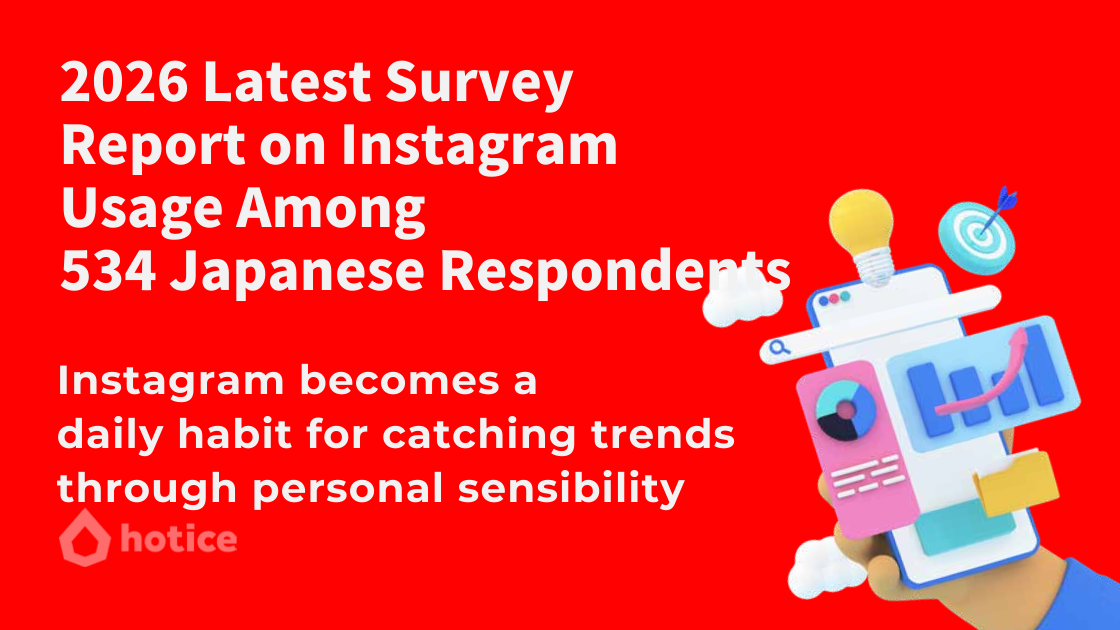The reality revealed by a survey of 512 people regarding their intention to request influencer PR.
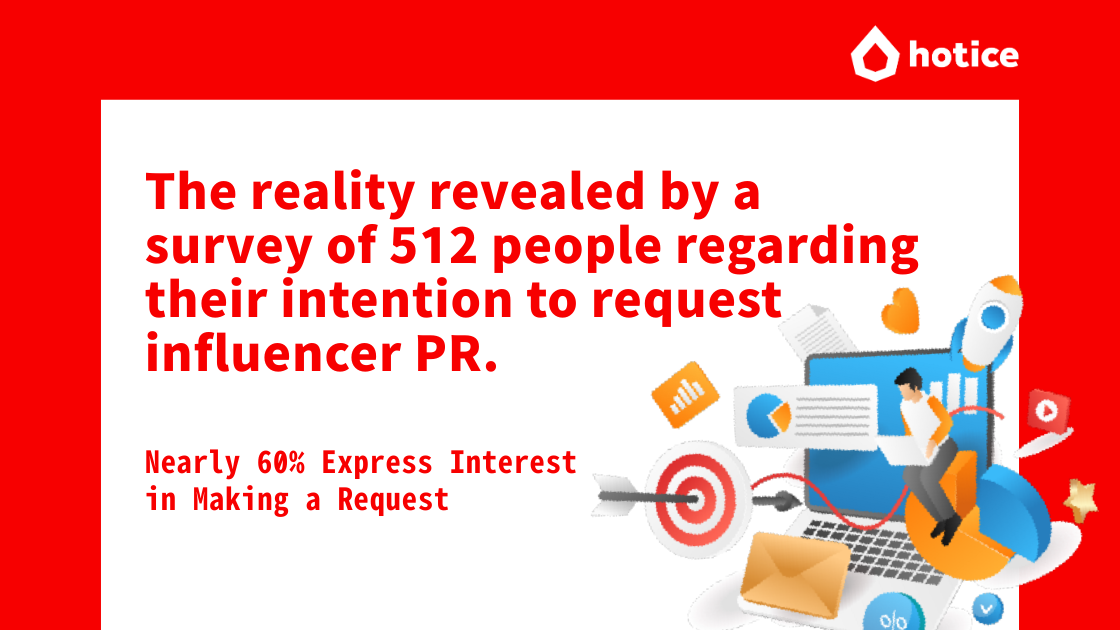
- 1. Survey Overview
- 2. Nearly 60% Express Interest in Making a Request
- 3. The Leading Reason: “Influence on Social Media”
- 4. Direct Requests vs. Agency Mediation: A Close Split
- 5. Key Factors: Follower Count and Engagement Rate
- 6. Beyond Sales: The Rise of “Buzz” as a Key Outcome
- 7. Only One in Three Have Actual Experience
- 8. Those Who Want to Work with Influencers vs. Those Who Don’t
- 9. More Than 60% Intend to Work with Influencers in the Future
- 10. For Influencer Partnerships in Japan, Choose hotice
We are now in an era where social media activity directly drives both purchasing decisions and brand recognition. Not only corporate advertising strategies but also the posts shared by individuals have begun to wield significant influence.
Within this shift, influencer marketing has emerged as a focal point. At the same time, many people still wonder, “How should I approach an influencer?” or “What are the actual costs and benefits?”
To explore these questions, we conducted a survey of 885 respondents, including both general consumers and corporate representatives, on their views about working with influencers. Drawing on the findings, this article takes a closer look at the motivations behind influencer collaborations, the challenges that arise, the key factors in choosing influencers, and the outlook for the future.
Survey Overview
To better understand attitudes toward requesting PR from influencers and marketing agencies, we conducted a nationwide survey of both general consumers and corporate representatives.
The survey was carried out online and yielded 885 valid responses. Participants were primarily office workers, public employees, business owners, self-employed individuals, and freelancers—groups regularly involved in business activities or information sharing. We asked about nine areas in total, including past experience with influencer requests, reasons for making them, methods used, key evaluation criteria, perceptions of outcomes, and future intentions.
In this article, we focus specifically on the 512 respondents who indicated they had considered requesting PR from an influencer or agency. By analyzing their motivations, challenges, and decision-making criteria, we reveal candid insights from both companies and individuals regarding influencer marketing.
Nearly 60% Express Interest in Making a Request
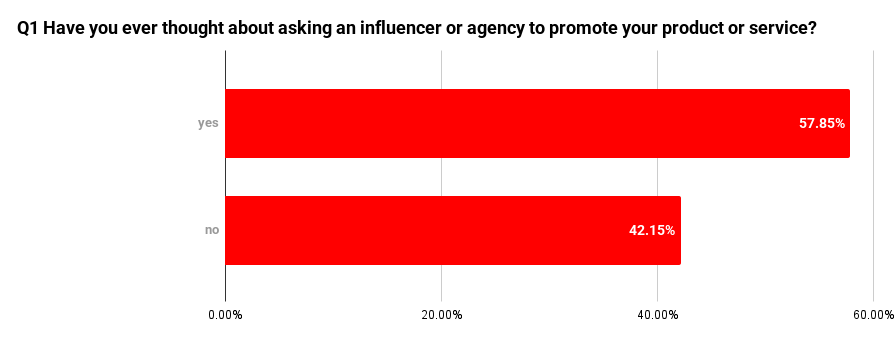
When asked whether they had ever considered requesting PR from an influencer or agency, 57.9% of respondents answered “yes.” In other words, nearly six in ten people showed a positive inclination, indicating that influencer marketing is already becoming widely accepted.
What this result suggests is a shift in perception: influencer content is no longer seen as mere advertising, but rather as a “trusted source of information.” On social media in particular, real experiences and personal reviews tend to resonate with consumers more strongly than posts from official corporate accounts. This trend appears to be fueling the growing intention to engage influencers.
At the same time, about 40% said they had never considered making such a request, reflecting a more cautious segment of the audience. Concerns about costs, measuring effectiveness, and difficulties in finding trustworthy partners are likely contributing factors.
The Leading Reason: “Influence on Social Media”
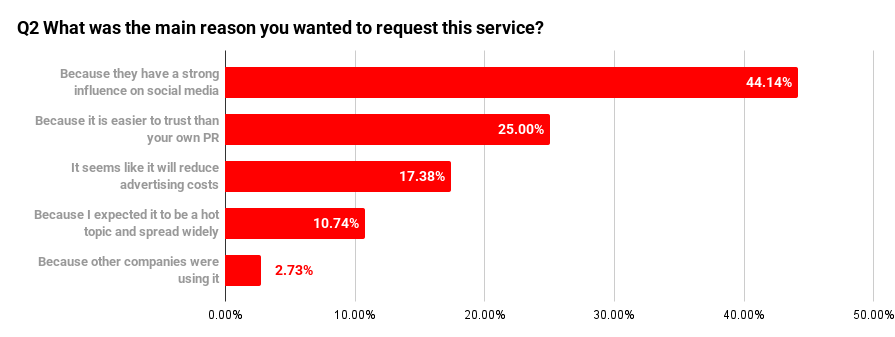
Among respondents who said they had considered requesting PR from an influencer or agency, the top reason was “strong influence on social media,” cited by 44.1%. This was followed by “credibility of their content” (25.0%), “lower advertising costs” (17.4%), and “high affinity with our brand” (10.7%).
These results highlight that the purpose of such requests is not simply advertising, but rather achieving a balance between wide reach and credibility.
On social platforms in particular, posts presented in a natural, conversational style tend to generate more engagement and are more readily accepted by followers compared to content that feels overtly promotional. For this reason, an influencer’s reach is valued less as “advertising exposure” and more as a form of expansion that carries empathy and resonance.
The third most common reason—“reducing advertising costs”—reflects the needs of small and medium-sized businesses and individual entrepreneurs seeking effective outcomes on limited budgets. Compared to television commercials or large-scale digital ads, influencer initiatives are seen as a relatively low-cost investment with the potential for significant returns.
Overall, the top reasons for making a request can be summarized by two key words: “reach” and “credibility.” This indicates that companies and brands are beginning to prioritize not just exposure, but the way their message is delivered and received.
Direct Requests vs. Agency Mediation: A Close Split
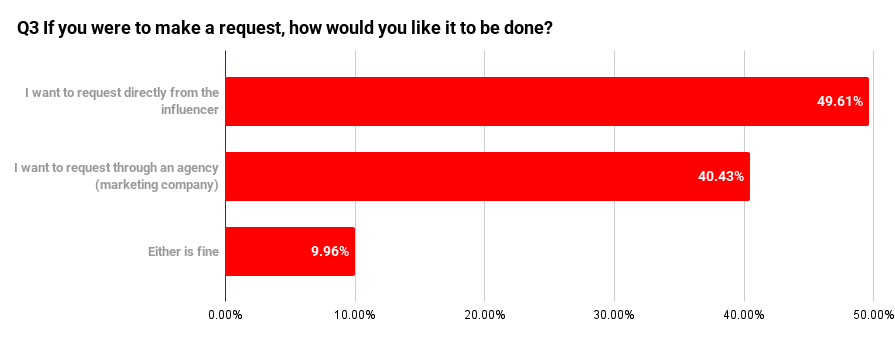
When asked how they would prefer to approach influencers or agencies, 49.6% of respondents said they would like to make a direct request, while 40.4% preferred going through an agency. The remaining 10.0% answered “not sure” or “other,” indicating that there are two clear pathways when it comes to choosing how to make a request.
Those leaning toward direct requests were often freelancers, small business owners, or operators of personal brands. They valued the flexibility and lower costs, as well as the closer proximity to influencers, which allows for faster communication. Increasingly, negotiations are conducted directly through DMs or comments on social media, reflecting the speed and immediacy unique to online platforms.
On the other hand, more than 40% chose agency mediation—a share too significant to overlook. The ability to assign multiple influencers at once, along with the reassurance of professional management of contracts, copyrights, and reputational risks, were cited as advantages. Particularly for corporate projects, agencies remain a preferred option due to their role in performance measurement and project management.
Although the methods differ, both approaches place importance on whether companies or individuals can collaborate effectively with the right partners. Looking ahead, we may see further polarization between smaller, direct collaborations and larger-scale campaigns managed through agencies.
Key Factors: Follower Count and Engagement Rate
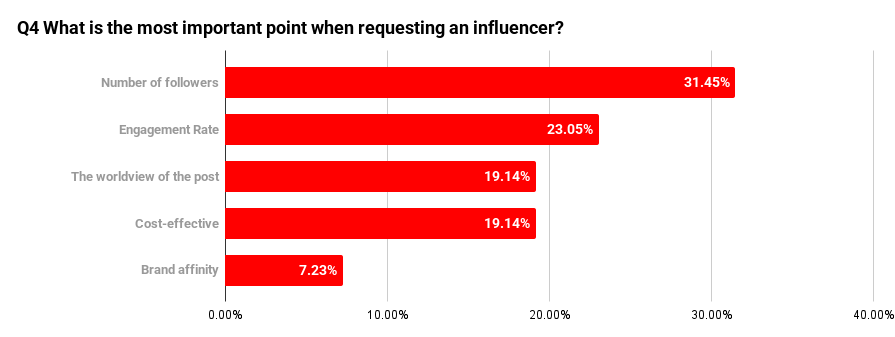
When asked which factors matter most in selecting an influencer, the top response was “follower count” (31.5%). This was followed by “engagement rate” (23.1%), with “overall aesthetic or worldview” (19.1%) and “alignment of content genre” (19.1%) coming in close behind.
These results show that both companies and individuals are evaluating influencers based on two dimensions: numerical influence and brand affinity. Follower count remains an easily understood metric and continues to be trusted as a straightforward indicator of potential reach.
At the same time, there is a growing emphasis on the quality of the relationship between influencers and their followers. High engagement rates are seen as evidence of trust and stronger resonance, signaling that the influencer’s content genuinely connects with their audience.
Notably, nearly 40% of respondents also highlighted “aesthetic consistency” and “genre alignment,” reflecting the rise of what can be called “empathy-driven PR.” In this approach, the influencer’s persona and style are matched with the brand’s identity, creating a sense of authenticity—“I believe it because this person says it” or “This fits our brand world.”
Taken together, these trends indicate a shift away from evaluating influencers purely by numbers. Selection is increasingly moving toward a more holistic assessment, where the ability to create genuine resonance may prove more critical than sheer reach in determining future success.
Beyond Sales: The Rise of “Buzz” as a Key Outcome
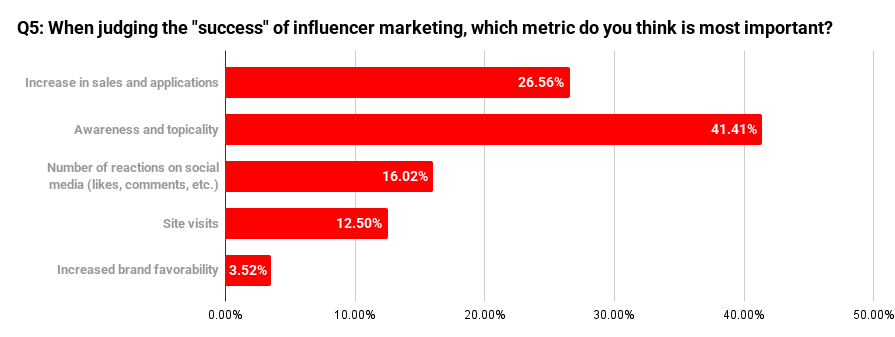
For many companies today, the question of “how much buzz did it generate?” is becoming just as important—if not more so—than direct sales results.
In our survey, the most valued outcome of influencer campaigns was “buzz or conversation” (41.4%). This was followed by “sales growth” (26.6%), “increase in followers” (16.0%), and “traffic to the company website” (12.5%). Clearly, many companies see the greatest value in the ripple effects of awareness and reach.
This trend is closely tied to the changing ways consumers encounter information. Increasingly, people discover products and services not through official advertising, but through someone’s social media post. As a result, a single moment of buzz can serve as the starting point for long-term brand recognition, often proving more impactful than a single purchase.
That said, a significant portion still prioritizes measurable outcomes such as sales or follower growth. More companies are now incorporating influencer campaigns into their KPI frameworks, using metrics like branded search volume, site traffic, and conversion rates to track results.
Marketing is thus evolving from intuition-driven PR toward data-driven strategies. Companies are also reframing influencers, not merely as “advertising billboards,” but as authentic storytellers for their brands. Even when sales aren’t immediate, the ability to spark genuine empathy and natural resonance is becoming the true benchmark of success.
Only One in Three Have Actual Experience
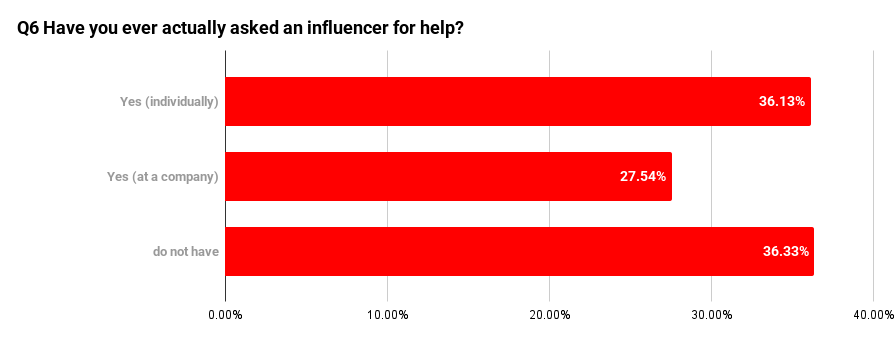
While interest in influencer marketing is growing, the number of people who have actually commissioned influencers remains limited. In this survey, 36.1% said they had done so as individuals, while 27.5% had done so in a corporate capacity. Meanwhile, 36.3% reported that they had never made such a request, meaning the overall implementation rate has yet to surpass half of respondents.
These results suggest that influencer marketing is gradually moving from the “attention stage” to the “trial stage.” In many companies, internal decision-making processes, budget allocations, and systems for measuring effectiveness are still underdeveloped, leading to a cautious, wait-and-see approach.
By contrast, individuals and small business owners tend to make decisions more quickly and are more willing to experiment with small-scale collaborations on social media.
This trend shows that marketing initiatives are no longer the sole domain of large corporations, but are expanding into the hands of individuals and small businesses. Although widespread adoption has not yet been achieved, if the success stories of early adopters become more visible, this movement is likely to accelerate further.
Those Who Want to Work with Influencers vs. Those Who Don’t
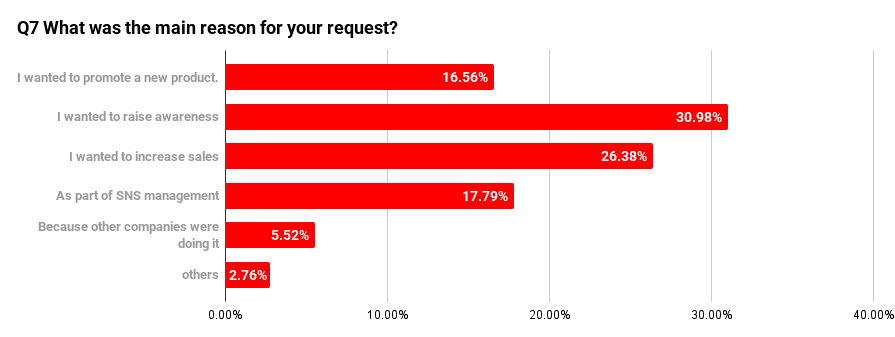
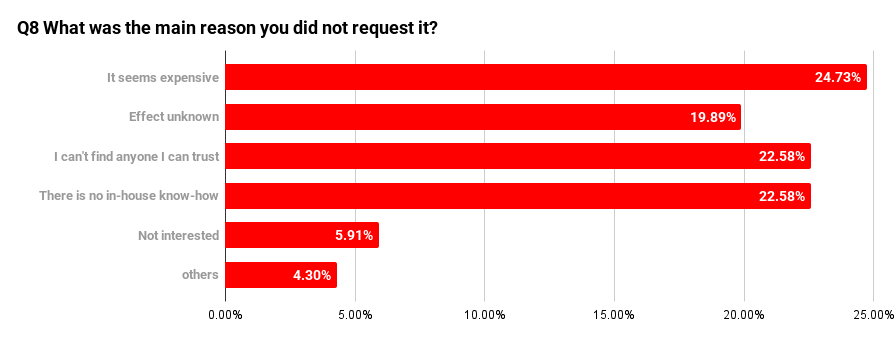
Between those who express interest in working with influencers and those who do not, there is a clear divide in perceptions—even when looking at the same influencer marketing initiatives.
In this survey, people inclined to make requests tended to emphasize “strong social media reach” (44.1%) and “credibility of content” (25.0%). On the other hand, those who were reluctant cited concerns such as “it seems too expensive” (33.6%), “the impact is unclear” (27.3%), and “it’s difficult to find someone trustworthy” (20.5%).
This contrast highlights two sides of the same coin: expectation and concern. While both groups share a desire for reliable communicators, those without prior experience are more likely to feel uncertain about whom to choose. In addition, the difficulty of clearly measuring return on investment remains a barrier for both companies and individuals.
For influencer marketing to be adopted more widely with confidence, it is essential to create an environment where clients feel they can work with trustworthy partners at fair prices. Greater transparency in matching and clearer visibility of results could encourage the large group of people who are “interested but hesitant” to finally take action.
More Than 60% Intend to Work with Influencers in the Future
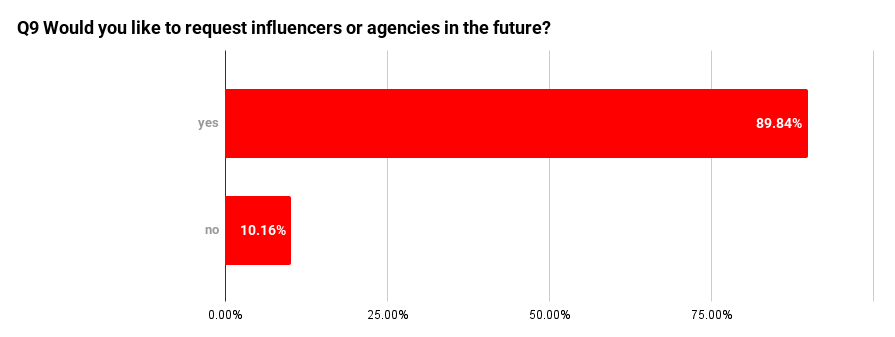
To conclude the survey, we asked whether respondents would like to request PR from influencers or agencies in the future. A majority of 57.9% said “yes.” This indicates that interest is expanding not only among those who already have experience, but also among many who want to try it for the first time.
The findings show that influencer marketing is no longer limited to a niche set of brand strategies. It is beginning to establish itself as a standard within the broader marketing mix. The ability to deliver messages naturally through social media—even to audiences that are difficult to reach with traditional advertising—stands out as a key reason behind this momentum.
Notably, a significant number of companies that had never previously worked with influencers expressed strong interest. As more of these businesses experiment and begin to see results, influencer collaborations are likely to evolve into long-term partnerships.
Challenges remain, particularly around ensuring credibility, managing costs, and measuring effectiveness. Yet the fact that over half of respondents expressed intent to “try it next time” underscores the strong potential of this field.
Looking ahead, influencer marketing will likely move beyond one-off PR campaigns toward building relationships where brands and influencers create value together. Communication rooted in empathy is steadily becoming the new norm for connecting companies and consumers.
For Influencer Partnerships in Japan, Choose hotice
To succeed in influencer marketing, it takes more than reach alone—it requires deep market understanding and cultural sensitivity. In Japan especially, success depends on building trust with consumers and ensuring that messaging aligns seamlessly with a brand’s identity.
hotice is an influencer marketing agency with a strong focus on the Japanese market. With a multinational team, we match the most suitable influencers to each industry and objective, providing end-to-end support from campaign planning to performance tracking.
Drawing on extensive experience, including collaborations with major corporations, we deliver safe and effective PR that respects both local culture and regulations.
If you are considering influencer initiatives in Japan, we invite you to consult with hotice to explore how we can help your brand succeed.
.png)





